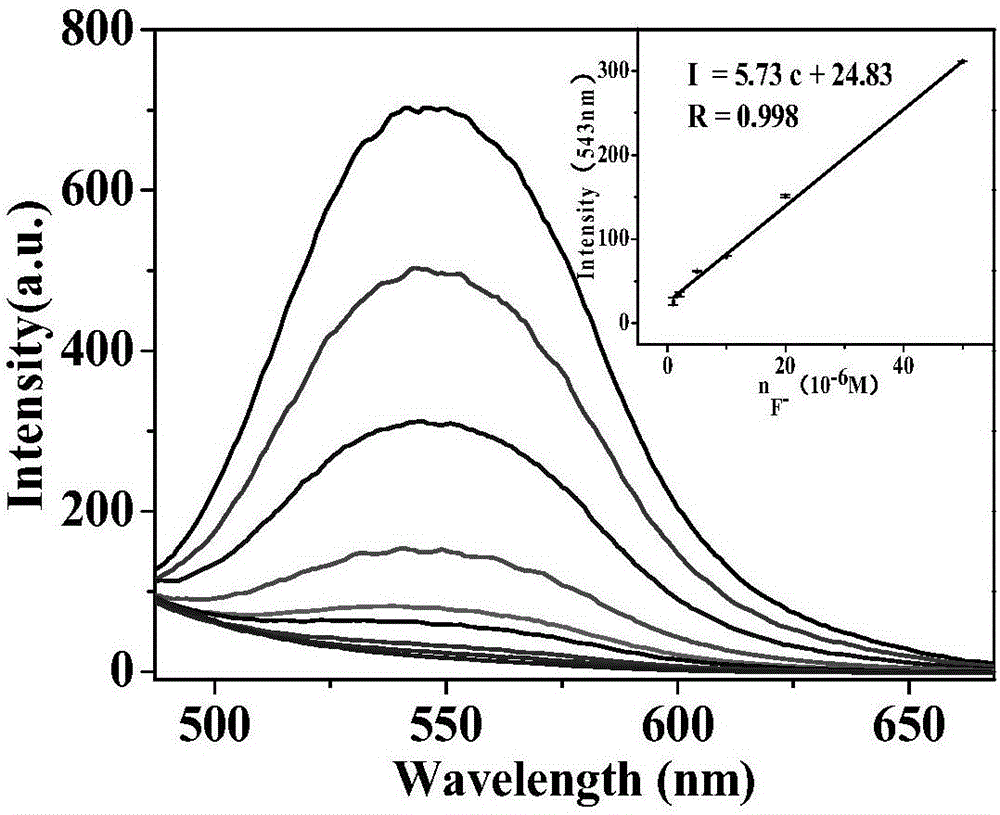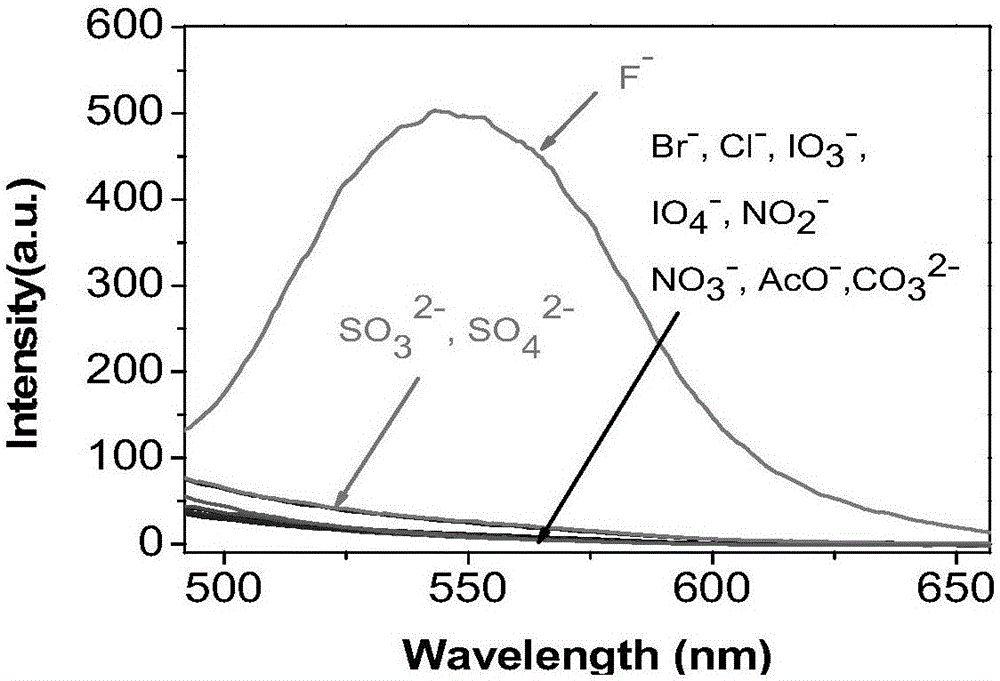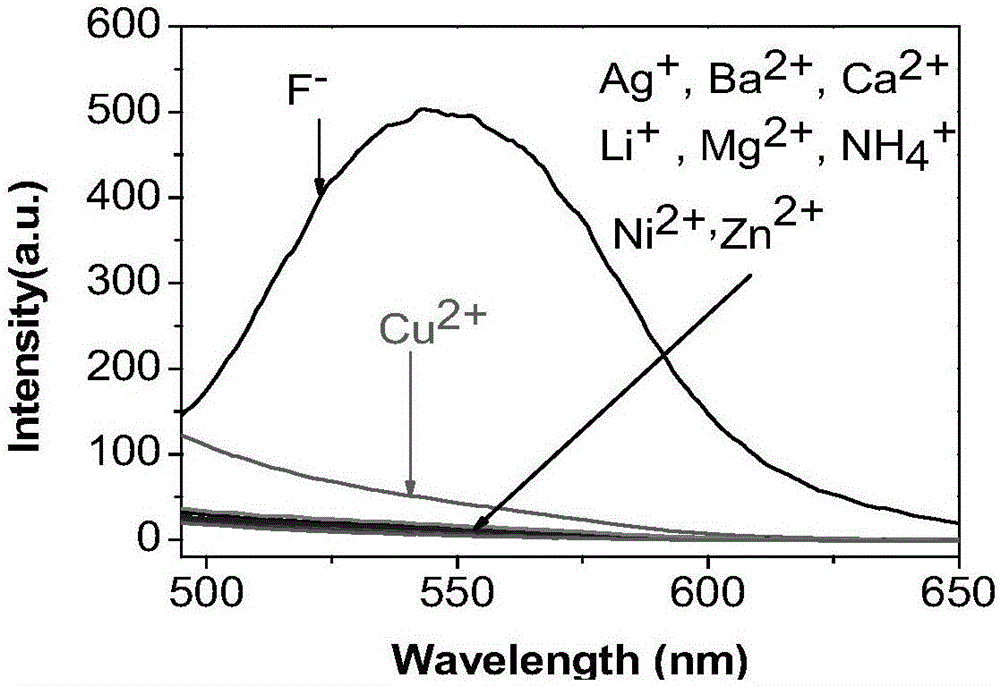Fluorine ion detection probe based on aggregation-induced emission as well as preparation method and application of fluorine ion detection probe
A technology for aggregation-induced luminescence and detection of probes, which is applied in the field of chemical analysis and detection, can solve the problems of fluorescence quenching, application of difficult aqueous solution systems, errors, etc., and achieve the effects of low detection limit, strong specificity and sensitive recognition
- Summary
- Abstract
- Description
- Claims
- Application Information
AI Technical Summary
Problems solved by technology
Method used
Image
Examples
Embodiment 1
[0045] Synthesis of fluorescent probes of the present invention
[0046] The preparation route of fluorescent probe of the present invention is as follows:
[0047]
[0048] (1) Synthesis of intermediate compound 2:
[0049]
[0050] Dissolve salicylaldehyde 1 and hydrazine hydrate with a mass fraction of 80% in absolute ethanol, the ratio of compound 1 to hydrazine hydrate is 2:1, stir at room temperature for 1 hour, the solid is completely precipitated, filtered, and the crude product Recrystallized with absolute ethanol to obtain compound 2 in the form of yellow needles;
[0051] (2) Preparation of fluorescent probe I
[0052]
[0053] Compound 2 and tert-butyldimethylchlorosilane were dissolved in anhydrous triethylamine, the ratio of compound 2 and tert-butyldimethylchlorosilane was 8:1, and stirred at room temperature for 24 hours After the reaction was completed, saturated brine was added, then extracted with ethyl acetate, dried over anhydrous sodium sulfate ...
Embodiment 2
[0056] Ratiometric Fluorescent Probe Molecular Working Curve
[0057] Take 2mL of the prepared water-dispersed solution of ratiometric fluorescent probe molecules, add 20μL of sodium fluoride aqueous solution with different concentrations (0, 1, 2, 5, 10, 20, 50, 100, 200μM), let it stand for 30min, and record the 543nm changes in fluorescence intensity. Taking the fluorescence intensity as the vertical axis and the fluorine ion concentration as the horizontal axis, the working curve of the ratio fluorescent probe molecule is obtained by fitting. In this embodiment, the ratiometric fluorescent probe is used for the determination of the concentration of fluoride ions. Under the excitation of 345nm excitation light, the relationship between the fluorescence intensity and the concentration of fluoride ions is as follows figure 1 shown.
Embodiment 3
[0059] Fluorescent Probe Molecular Anion Selective Determination
[0060] Take 2mL of the aqueous dispersion solution of the ratio fluorescent probe molecule prepared in Example 2, add 20 μL of Cl with a concentration of 0.01M - ,Br - ,IO 3 - ,IO 4 - ,NO 3 - ,NO 2 - , Ac - ,CO 3 2- , SO 4 2- , SO 3 2- , aqueous solution, after standing for 30min, the fluorescence spectrometer recorded the change of fluorescence intensity at 543nm respectively. Experimental results show that, except for fluoride ions, other particles do not cause obvious changes in fluorescence, indicating that the probe molecules of the present invention have good selectivity. In this embodiment, the molecular selectivity of the fluorescent probe is determined. Under the excitation of 345nm excitation light, the relationship between the fluorescence intensity and the concentration of fluorine ions is as follows figure 2 shown.
PUM
 Login to View More
Login to View More Abstract
Description
Claims
Application Information
 Login to View More
Login to View More - R&D
- Intellectual Property
- Life Sciences
- Materials
- Tech Scout
- Unparalleled Data Quality
- Higher Quality Content
- 60% Fewer Hallucinations
Browse by: Latest US Patents, China's latest patents, Technical Efficacy Thesaurus, Application Domain, Technology Topic, Popular Technical Reports.
© 2025 PatSnap. All rights reserved.Legal|Privacy policy|Modern Slavery Act Transparency Statement|Sitemap|About US| Contact US: help@patsnap.com



